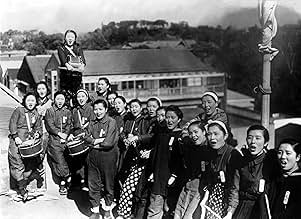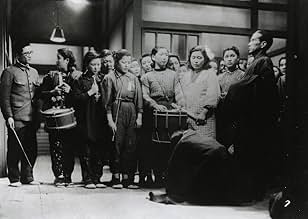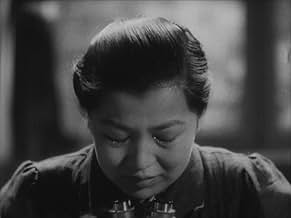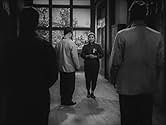IMDb RATING
5.6/10
2.7K
YOUR RATING
World War II film about female volunteer workers at an optics plant who do their best to meet production targets.World War II film about female volunteer workers at an optics plant who do their best to meet production targets.World War II film about female volunteer workers at an optics plant who do their best to meet production targets.
- Director
- Writer
- All cast & crew
- Production, box office & more at IMDbPro
Featured reviews
During the World War II, the management of a war industry of optical instruments for weapons requests an effort from the workers to increase the productivity during four months. The target for male workers is an increase of 100% of the production, but the female workers, led by the dedicated Tsuru Watanabe (Yôko Yaguchi), ask the direction to surpass their goal from 50% to 70%. Along the period, the women have to overcome illness and their personal problems to complete their quote.
"Ichiban Utsukushiku" is a war propaganda and tribute to the Japanese female workers in times of war by Akira Kurosawa recommended only for fans of this great director. The plot is boring in many moments, but I liked to see the humanization of the nationalist Japanese workers and this unusual perspective from a people that were sooner defeated in the war. The winners usually write the history from their perspective and this film is a rare testimony from the Japanese point of view. Watanabe is an enlightened character with her dedication and positive leadership. My vote is six.
Title (Brazil): "A Mais Bela" ("The Most Beautiful")
"Ichiban Utsukushiku" is a war propaganda and tribute to the Japanese female workers in times of war by Akira Kurosawa recommended only for fans of this great director. The plot is boring in many moments, but I liked to see the humanization of the nationalist Japanese workers and this unusual perspective from a people that were sooner defeated in the war. The winners usually write the history from their perspective and this film is a rare testimony from the Japanese point of view. Watanabe is an enlightened character with her dedication and positive leadership. My vote is six.
Title (Brazil): "A Mais Bela" ("The Most Beautiful")
Ichiban utsukushiku (1944) 'THE MOST BEAUTIFUL' is Akira Kurosawa's tribute to Japanese Women who supported the war effort (WWII) at the 'Home-Front'. It is analogous to films made in other countries at that time. The nations that participated in the conflict all called upon Women too help in the manufacturing process. Some successfully like Great Britain, Soviet Russia and the U.S.A. Others like China, Fascist Italy or Nazi Germany less so, with Imperial Japan falling in between. Not from lack of effort, but of resources.
Like LETTERS FROM IWO JIMA (2006) the film shows the war from the Japanese perspective. This is a propaganda film. That does not invalidate its message compared with the other participants in the conflict, it is just another point of view, made in wartime. The Women work in a optical factory which could pass for a 'Dickensian Workhouse'. Their work is important and they know it. The pressure of increased productivity with limited resources is clearly shown. It effects them all emotionally, physically and psychologically. The Men of the factory for the most part are unseen drones, except for the managers of the plant. They take a sensitive interest in the well being of their Female staff, without taking advantage of them. The War is largely unseen, but you know it is out there and getting closer all the time. The Director could see the end was coming, even if the Imperial General Staff could not.
The principal cast of Women actors are largely unknowns whose careers were brief before and after this film. They are all convincing in their roles and give believable characterizations. The only 'Star' recognizable too Western audiences would be the great TAKASHI SHIMURA. SHIMURA was a 'jake of all trades' for the TOHO Studios, Japan. His acting range spanned Business Men, Criminals, Detectives, Samurai and Scientists. Films of note, SHICHININ NO SAMURAI (1954) 'The Seven Samurai', GOJIRA (1954) 'Godzilla', CHIKYU BOEIGUN (1957) 'The Mysterians' and YOJIMBO (1961) 'Yojimbo, The Bodyguard'.
Those who have TCM or a well stocked local Library can take advantage of the films of AKIRA KUROSAWA and they should.
Like LETTERS FROM IWO JIMA (2006) the film shows the war from the Japanese perspective. This is a propaganda film. That does not invalidate its message compared with the other participants in the conflict, it is just another point of view, made in wartime. The Women work in a optical factory which could pass for a 'Dickensian Workhouse'. Their work is important and they know it. The pressure of increased productivity with limited resources is clearly shown. It effects them all emotionally, physically and psychologically. The Men of the factory for the most part are unseen drones, except for the managers of the plant. They take a sensitive interest in the well being of their Female staff, without taking advantage of them. The War is largely unseen, but you know it is out there and getting closer all the time. The Director could see the end was coming, even if the Imperial General Staff could not.
The principal cast of Women actors are largely unknowns whose careers were brief before and after this film. They are all convincing in their roles and give believable characterizations. The only 'Star' recognizable too Western audiences would be the great TAKASHI SHIMURA. SHIMURA was a 'jake of all trades' for the TOHO Studios, Japan. His acting range spanned Business Men, Criminals, Detectives, Samurai and Scientists. Films of note, SHICHININ NO SAMURAI (1954) 'The Seven Samurai', GOJIRA (1954) 'Godzilla', CHIKYU BOEIGUN (1957) 'The Mysterians' and YOJIMBO (1961) 'Yojimbo, The Bodyguard'.
Those who have TCM or a well stocked local Library can take advantage of the films of AKIRA KUROSAWA and they should.
10matt605
If you study this film then you can learn much about Japan, World War Two, and Akira Kurosawa. This is the only film he made that was meant to be propaganda, but his earlier film Sanshiro Sugata actually played to themes more useful to a nation at war. If you make a film that matches the zeitgeist of your country, that's great. But be forewarned that your country's government may then ask you to inspire the people to fight on, and you would then make a propaganda film, which is what may have happened to Kurosawa. This fact shouldn't make you reject The Most Beautiful because cinema in all countries in WW2 was used in the war effort. Japan was no exception.
Kurosawa in interviews after the war revealed his dislike of the government censors. Toward the end of the war, Japanese were preparing for the possibility of the entire nation receiving an order from the Emporer to commit suicide, called "the Honorable Death of the 100 Million." Kurosawa didn't dispute that he would have followed the Emporer's directive, but did say that he and his colleagues jokingly agreed they would first go and kill all the censors.
The plot and action of the film is described elsewhere. There are things to watch for carefully as you view the film.
If you're in a university setting then there is one absolute advantage that you have -- access to a professor of management and organizational behavior. Why? Well, The Most Beautiful is practically a docu-drama on management science. The scientific methods of production and organizational management are more clearly documented in this film than in any other I can recall, anywhere. It also compares things like Stakhanovism to Hawthorne experiment studies and displays the early beginnings of total quality management and quality assurance methods later developed by Deming. If these terms are unfamiliar to you, then you need a professor of management science to watch the film and help you see what Kurosawa was putting in. Then consider that the film was released to the Japanese public, which assured that it would be viewed by American military intelligence organizations and the OSS.
Some specifics to look for in no particular order: the background music includes a sampling from Semper Fi, the USMC theme song; there's little talk of enemies but when they're mentioned, the British are named ahead of Americans; the factory managers back a young woman's rejection of her father's instruction to come home and take the place of his deceased wife, which is a break with tradition (almost the equivalent of bra-burning in wartime Japan); and, backgrounds are set in wartime Japan and reveal details of the industrial infrastructure.
There are many films by Kurosawa that feature sickness and health care in their plots. This one, Drunken Angel, Ikuru, The Quiet Duel, and Red Beard come to mind. Dodes' ka-den and Ran might also qualify as their main characters suffer from afflictions of the mind. Kurosawa's biggest films are Rashomon and The Seven Samurai, but his films with health and medicine in the plot are more prevalent in his career.
One caveat to The Most Beautiful is that it is long and does reflect the tastes of Japanese audiences who like their drama very obvious. Forgive yourself if you find Japanese drama becomes too boring in some places. The films can be very enjoyable and interesting, provided you approach them with the understanding that they are far different from what we experience as entertainment today.
Kurosawa in interviews after the war revealed his dislike of the government censors. Toward the end of the war, Japanese were preparing for the possibility of the entire nation receiving an order from the Emporer to commit suicide, called "the Honorable Death of the 100 Million." Kurosawa didn't dispute that he would have followed the Emporer's directive, but did say that he and his colleagues jokingly agreed they would first go and kill all the censors.
The plot and action of the film is described elsewhere. There are things to watch for carefully as you view the film.
If you're in a university setting then there is one absolute advantage that you have -- access to a professor of management and organizational behavior. Why? Well, The Most Beautiful is practically a docu-drama on management science. The scientific methods of production and organizational management are more clearly documented in this film than in any other I can recall, anywhere. It also compares things like Stakhanovism to Hawthorne experiment studies and displays the early beginnings of total quality management and quality assurance methods later developed by Deming. If these terms are unfamiliar to you, then you need a professor of management science to watch the film and help you see what Kurosawa was putting in. Then consider that the film was released to the Japanese public, which assured that it would be viewed by American military intelligence organizations and the OSS.
Some specifics to look for in no particular order: the background music includes a sampling from Semper Fi, the USMC theme song; there's little talk of enemies but when they're mentioned, the British are named ahead of Americans; the factory managers back a young woman's rejection of her father's instruction to come home and take the place of his deceased wife, which is a break with tradition (almost the equivalent of bra-burning in wartime Japan); and, backgrounds are set in wartime Japan and reveal details of the industrial infrastructure.
There are many films by Kurosawa that feature sickness and health care in their plots. This one, Drunken Angel, Ikuru, The Quiet Duel, and Red Beard come to mind. Dodes' ka-den and Ran might also qualify as their main characters suffer from afflictions of the mind. Kurosawa's biggest films are Rashomon and The Seven Samurai, but his films with health and medicine in the plot are more prevalent in his career.
One caveat to The Most Beautiful is that it is long and does reflect the tastes of Japanese audiences who like their drama very obvious. Forgive yourself if you find Japanese drama becomes too boring in some places. The films can be very enjoyable and interesting, provided you approach them with the understanding that they are far different from what we experience as entertainment today.
A curious film from Kurosawa, given what came later, this is a nationalist film about a group of young women who are working at an optical instruments factory who are given the task to greatly increase productivity for the good of the country and the war effort. It shows them rarely at play, mostly very focused at work. Takako Irie plays the dorm mother, a somewhat sympathetic character. This film is more inherently Japanese than most of Kurosawa's later work, its almost a propaganda film. However, there is also some heart in the characters, and that is what makes it a recommended film. You sense the young ladies anguish over being sick and having family difficulties, making them unable to work. So, not essential viewing but still watchable and Kurosawa fans should check it out.
Can outright propaganda lead to a great film experience? I think so. Mikhail Kalatozov's Soy Cuba was nothing but propaganda for the Cuban Revolution, and it's a remarkable watch. The problem in general, I think, is that the demands of propaganda and drama are almost always diametrically opposed. Drama requires certain stakes and potentialities that propaganda is naturally resistant towards. It also requires a certain level of subtlety that is anathema to propaganda. You don't need a subtly driven message of duty to one's country, you need to hit your audience over the head with duty to Imperial Japan against America and Britain. That lack of subtlety combined with the fact that there is no antagonist really derails any sort of audience investment in the actions of the characters in Akira Kurosawa's second film, a film specifically made for propaganda purposes, funded by the Japanese government in the middle of World War II.
The story is about a group of female workers in a factory that specializes in lenses for the military. We never see an American or Brit, instead we just follow the girls as they try to deal with life during a four months period where production must increase over quotas. Something felt off about this film from the beginning when Watanabe (Yoko Yaguchi) cries to management that it's unfair that the men's quota went up by 100% but the women's quota only went up by 50%. Surely management, led by the director of the plant (Takashi Shimura), doesn't think so little of the women and their commitment to the cause. Surely they can raise the women's quota to 67%. When Watanabe comes back and tells all the girls of her successful negotiation, they all break into cheers. Do I believe that Japanese women would feel great senses of duty to the Empire and the cause? Yes, I do. Do I believe that they would endeavor to work as hard as possible? Yes. The issue is that it's all too easy. There's never a dissenting voice in the group about the work they have to do or the pressures on them. Management is kindly patriarchal and never harsh. There's no real drama here. It's all just dedication to the cause.
The bulk of the movie tracks the girls' morale against the output with a very clear relationship between them being happy and them meeting their goals over the four months. The pieces that feel like drama are a girl, Suzumura (Asako Suzuki) getting slightly sick and her father coming from the country to Tokyo to take her home with the rest of the girls crying as she leaves with her begging their forgiveness for missing work. There's another girl, Koyama (Haruko Toyama) who constantly runs a slight fever at night, but Watanabe covers for her so that she can work while protecting her from other physical activity. When the woman who runs their dorm, Mizushima (Takako Irie), leaves for a few days to try and bring Suzumura back, the other girls turn on Watanabe, with her quietly accepting the verbal assault until Toyama tells everyone the truth about her low-grade fever and how it's all for the cause of helping them meet their quota. These bits of drama amount to little of interest because the characters are so uniform and everything is brought up and forgotten in minutes. All of these girls are completely interchangeable because they have no real character or desire other than to help increase output for the cause.
The ending of the film is dominated by a single event where Watanabe, in her job as an inspector of the lenses after production, misplaced a lens she hadn't fully inspected. If she doesn't find it and it goes out, there could be Japanese lives at risk, so she spends all night looking, eventually finding it with little more than a pat on the back by management. They're happy she worked so hard and not mad at all for her for the mistake. It's all very sanitized.
And that really points to a problem with propaganda like this. None of the girls can have any question about the cause or being overworked or have problems with management. Problems have to be with people who aren't dedicated to the cause (a father figure far removed from the factory) while it can't be anyone in the factory because that could imply there are saboteurs in actual factories. Without any real antagonists, problems have to come from misunderstandings between like-minded individuals. It's just not that interesting.
The most interesting thing about the film is two-fold. The first is the look at a real optics factory in Imperial Japan. It's almost a pseudo-documentary about the manufacture of lenses in a certain way. The second is Kurosawa's eye. There are times when the film is quite nice to look at. They're fewer and further between than in Sanshiro Sugata, but they are there. There's a shot of the girls gathered round a pair of barrels that's quite striking, and there's a small moment where one of the girls goes outside in the middle of the night into the vegetable garden they keep with the moon featured prominently in very nice ways.
Otherwise, the movie is kind of a drag. There's no real drama. The characters are thin and interchangeable. This was a burgeoning artist working under a tight artistic regime that demanded a storytelling mode that wasn't really amenable to compelling cinema.
The story is about a group of female workers in a factory that specializes in lenses for the military. We never see an American or Brit, instead we just follow the girls as they try to deal with life during a four months period where production must increase over quotas. Something felt off about this film from the beginning when Watanabe (Yoko Yaguchi) cries to management that it's unfair that the men's quota went up by 100% but the women's quota only went up by 50%. Surely management, led by the director of the plant (Takashi Shimura), doesn't think so little of the women and their commitment to the cause. Surely they can raise the women's quota to 67%. When Watanabe comes back and tells all the girls of her successful negotiation, they all break into cheers. Do I believe that Japanese women would feel great senses of duty to the Empire and the cause? Yes, I do. Do I believe that they would endeavor to work as hard as possible? Yes. The issue is that it's all too easy. There's never a dissenting voice in the group about the work they have to do or the pressures on them. Management is kindly patriarchal and never harsh. There's no real drama here. It's all just dedication to the cause.
The bulk of the movie tracks the girls' morale against the output with a very clear relationship between them being happy and them meeting their goals over the four months. The pieces that feel like drama are a girl, Suzumura (Asako Suzuki) getting slightly sick and her father coming from the country to Tokyo to take her home with the rest of the girls crying as she leaves with her begging their forgiveness for missing work. There's another girl, Koyama (Haruko Toyama) who constantly runs a slight fever at night, but Watanabe covers for her so that she can work while protecting her from other physical activity. When the woman who runs their dorm, Mizushima (Takako Irie), leaves for a few days to try and bring Suzumura back, the other girls turn on Watanabe, with her quietly accepting the verbal assault until Toyama tells everyone the truth about her low-grade fever and how it's all for the cause of helping them meet their quota. These bits of drama amount to little of interest because the characters are so uniform and everything is brought up and forgotten in minutes. All of these girls are completely interchangeable because they have no real character or desire other than to help increase output for the cause.
The ending of the film is dominated by a single event where Watanabe, in her job as an inspector of the lenses after production, misplaced a lens she hadn't fully inspected. If she doesn't find it and it goes out, there could be Japanese lives at risk, so she spends all night looking, eventually finding it with little more than a pat on the back by management. They're happy she worked so hard and not mad at all for her for the mistake. It's all very sanitized.
And that really points to a problem with propaganda like this. None of the girls can have any question about the cause or being overworked or have problems with management. Problems have to be with people who aren't dedicated to the cause (a father figure far removed from the factory) while it can't be anyone in the factory because that could imply there are saboteurs in actual factories. Without any real antagonists, problems have to come from misunderstandings between like-minded individuals. It's just not that interesting.
The most interesting thing about the film is two-fold. The first is the look at a real optics factory in Imperial Japan. It's almost a pseudo-documentary about the manufacture of lenses in a certain way. The second is Kurosawa's eye. There are times when the film is quite nice to look at. They're fewer and further between than in Sanshiro Sugata, but they are there. There's a shot of the girls gathered round a pair of barrels that's quite striking, and there's a small moment where one of the girls goes outside in the middle of the night into the vegetable garden they keep with the moon featured prominently in very nice ways.
Otherwise, the movie is kind of a drag. There's no real drama. The characters are thin and interchangeable. This was a burgeoning artist working under a tight artistic regime that demanded a storytelling mode that wasn't really amenable to compelling cinema.
Did you know
- TriviaIn order to save film during wartime, the Japanese government ordered films to be released to have no opening titles and thus giving no credit to most of the actors or workers on each film. This included "The Most Beautiful" (1944).
- ConnectionsReferenced in Kurosawa: The Last Emperor (1999)
- How long is The Most Beautiful?Powered by Alexa
Details
- Runtime
- 1h 25m(85 min)
- Color
- Sound mix
- Aspect ratio
- 1.37 : 1
Contribute to this page
Suggest an edit or add missing content






























